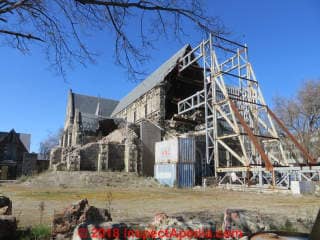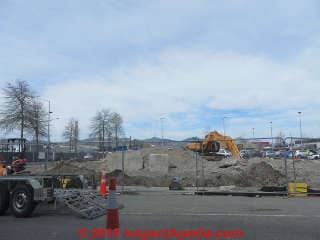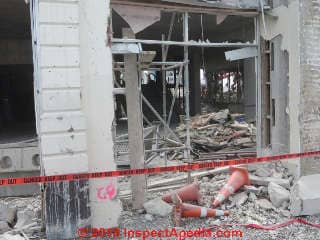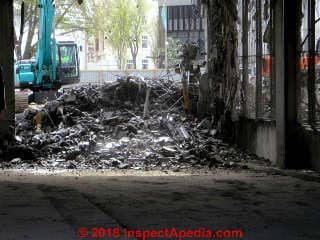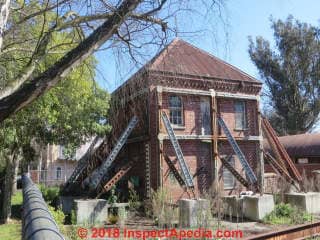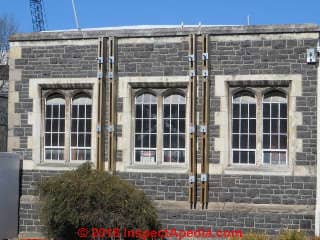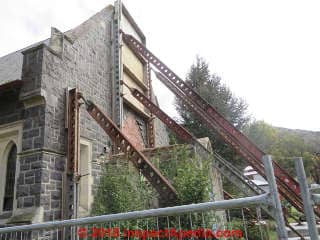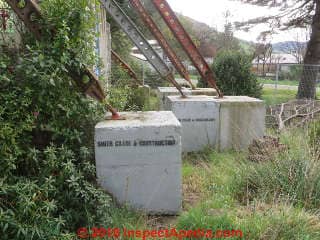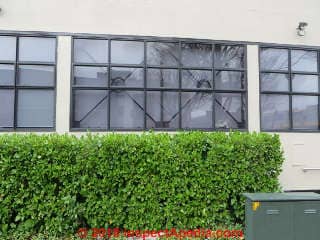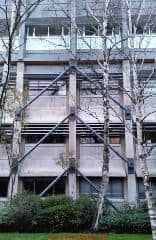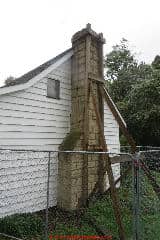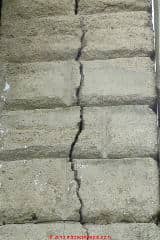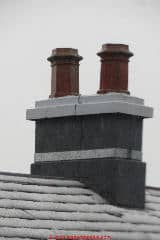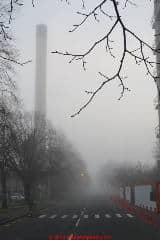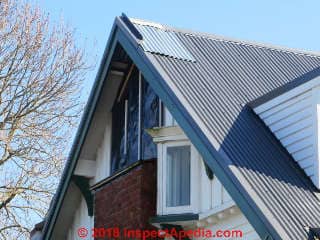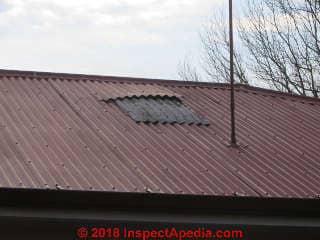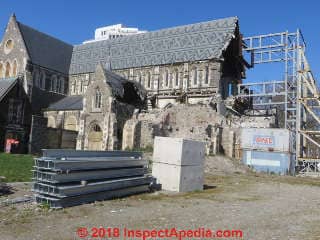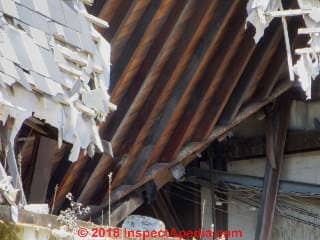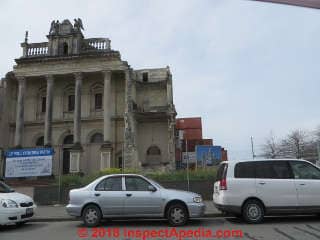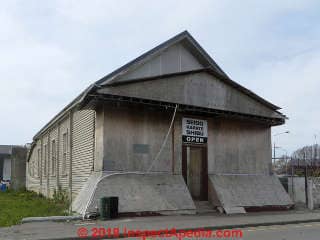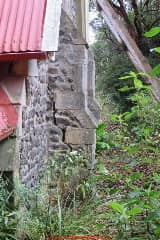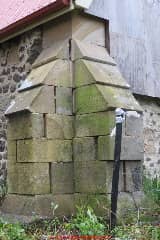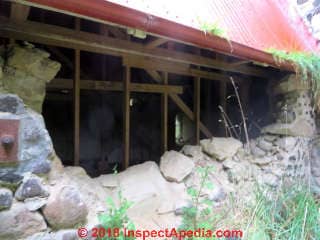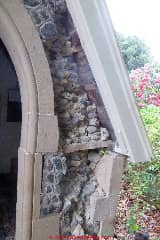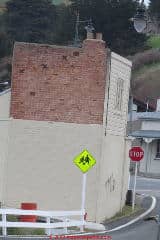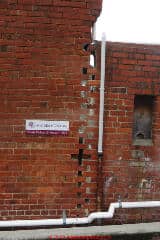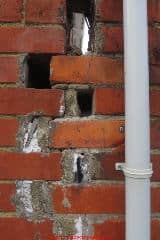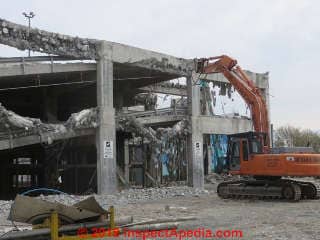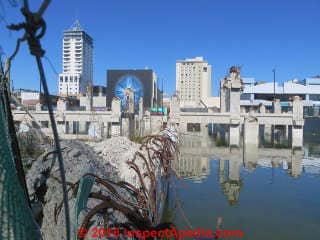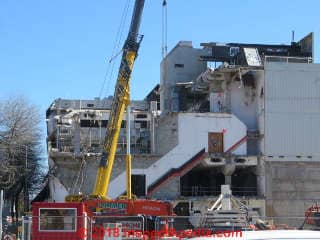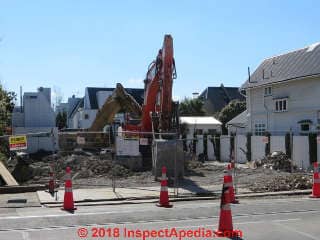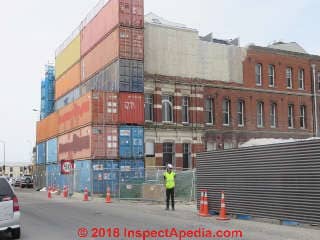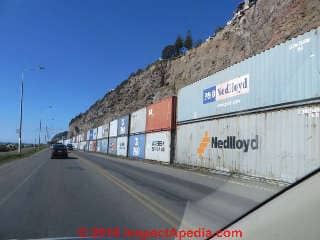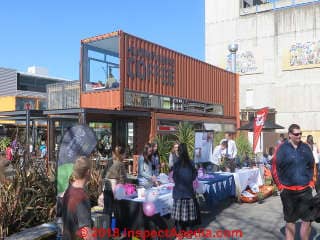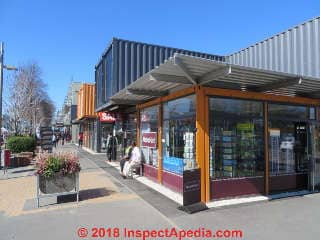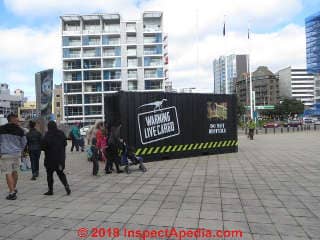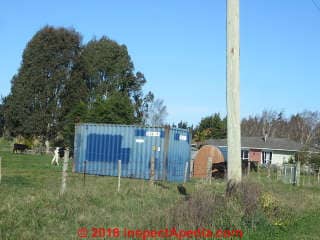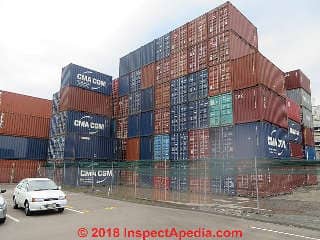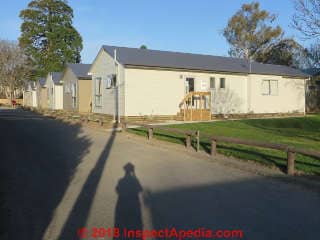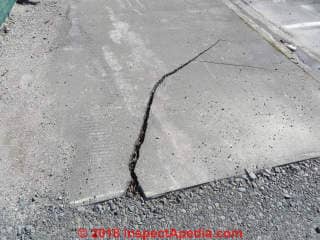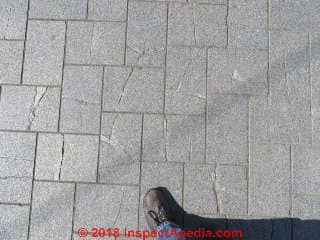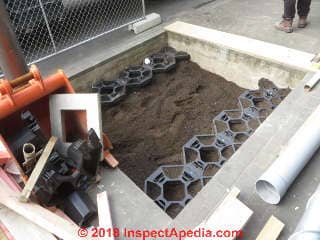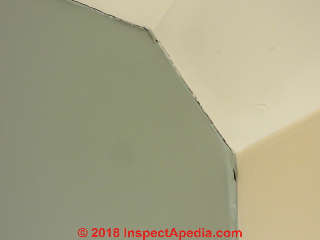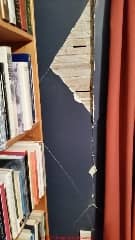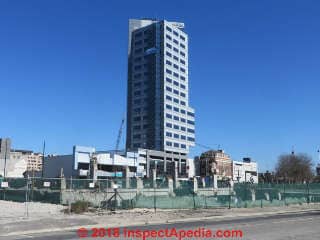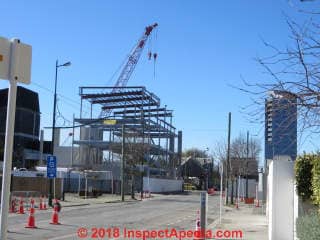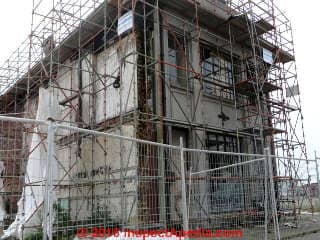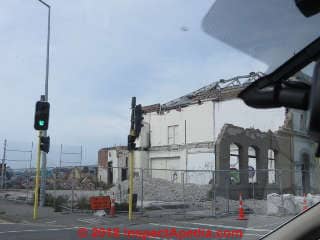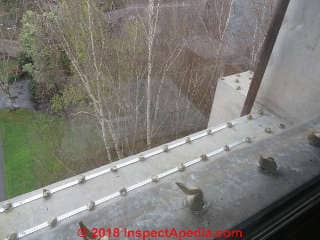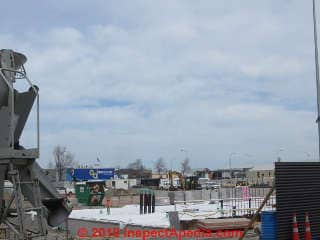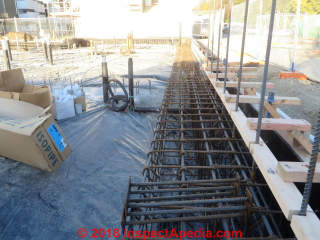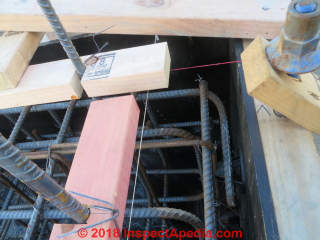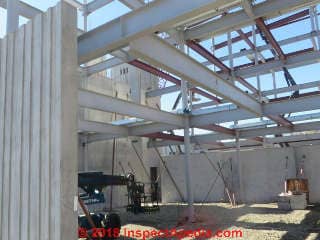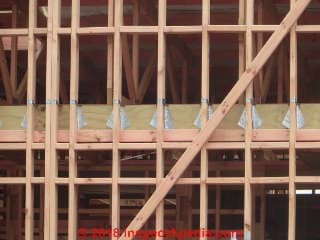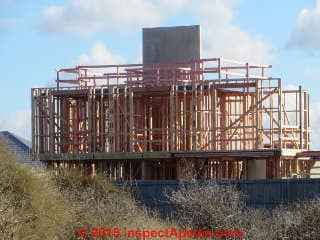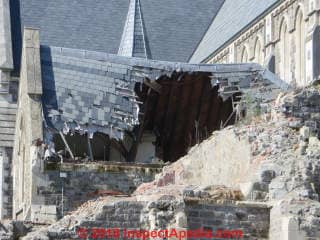 Christchurch Earthquake Damage Photographs
Christchurch Earthquake Damage Photographs
Christchurch New Zealand Quakes 2010 - 2011
- POST a QUESTION or COMMENT about photographs of various types of earthquake damage to buildings
Photographs of types of earthquake damage:
Photos of earthquake damage in Christchurch NZ, caused by the 2010 & 2011 earthquakes and their after-shocks.
[DRAFT Article in-process]
These images were taken in 2014 when reconstruction efforts in Christchurch included a mix of ongoing demolition and removal of un-safe structures as well as repair, reinforcement, and new construction of replacement buildings.
This article series describes earthquake damage graphically, providing details & examples of points of failure in various types of structures. We include expert source citations and references to additional articles on specific areas of earthquake damage to structures such as chimneys, foundations, mechanical systems, and to earthquake-damage control construction details typical for residential and light commercial structures.
InspectAPedia tolerates no conflicts of interest. We have no relationship with advertisers, products, or services discussed at this website.
- Daniel Friedman, Publisher/Editor/Author - See WHO ARE WE?
Earthquake Damage Photo Library: Christchurch 2010 - 2011 as of 2014
Page top and shown here: the Cathedral Church of Christ, damaged by the 4 September 2010 quake, but not severely, had been reinforced in an effort to stabilize the structure pending further repairs. The church was re-opened on September 22 but suffered more damage during an aftershock in December of 2010.
After the 22 February 2011 Christchurch earthquake, damage to the church was much more extensive.
Following an additional series of quakes in December 2011 the cathedral's rose window that had been braced by the scaffolding in my photo collapsed, and the scaffolding and reinforcement were then bracing little more than open air.
[Click to enlarge any image]
The Christchurch earthquake damage photographs shown here, taken by the author [DF] were taken in Christchurch , New Zealand in the fall of 2014 as well as in other locations throughout the South Island and on the North Island as well.
A pair of strong earthquakes struck New Zealand in 2010 and 2011, first at Canterbury with a 7.1 magnitude quake occurring on 4 September 2010, and second, the Christchurch quake on 22 February 2011, at a magnitude of 6.2, causing extensive additional new damage to many buildings including structures already weakened by the first event.
The severity of the second New Zealand quake might be understood by noting that the primary shock lasted only about ten seconds, but because of its shallowness, its location, the previous damage to buildings in Christchurch , and extensive soil liquefaction in the eastern neighbourhoods of the city.
185 people died and many buildings were severely injured.
The earthquake damage, damaged building demolition, earthquake damage re-build or repair, and earthquake-damaged-building reinforcement photographs here give a view of conditions in Christchurch three years after the 2011 Christchurch quake.
By 2014 large areas of downtown Christchurch were open spaces as damaged buildings had been removed, and some new construction had been completed.
Still shipping containers were in very extensive use throughout the South Island as commercial space and for other building purposes, and driving through downtown Christchurch the view of work in progress was still dominated by building demolition rather than new construction.
By this time Christchurch had lost enough population that its position had shifted from second to third most-populated city in New Zealand.
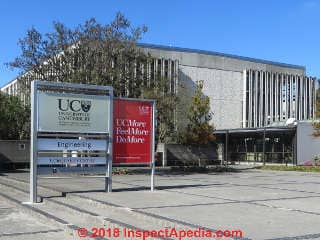 These New Zealand earthquake damage photographs, taken in the fall of 2014, can be contrasted with those from the Northridge California quake shown at EARTHQUAKE DAMAGE PHOTOS CA 1994 and might give insight to the different ways that building damage appears as a function of the type of movement that occurs during the quake.
These New Zealand earthquake damage photographs, taken in the fall of 2014, can be contrasted with those from the Northridge California quake shown at EARTHQUAKE DAMAGE PHOTOS CA 1994 and might give insight to the different ways that building damage appears as a function of the type of movement that occurs during the quake.
Engineers in New Zealand, including the UC Quake Centre at the University of Canterbury are, in my view, the current world- experts in earthquake damage assessment, repair, and prevention.
These experts have produced an entire library of failure, damage assessment, and construction research advice and recommendations.
Although I have experience in building inspection and failure investigation the images and photos here show earthquake damage and reconstruction details on both South Island and North Island.
Technically this work is amateur in scope and is provided here simply for study.
CONTACT US for permission to re-use these images, or if you are a professional requiring higher resolution images, video of demolition, or more information.
Additional photographs of other earthquake locations and damage are being added to this series. Contributions are requested to expand this resource, without charge, for scholarly or professional purposes.
Bracing of Earthquake-Damaged Structures: Christchurch 2014
Above: External bracing on all four walls, Christchurch, September 2014.
Below: gable end bracing at the Catholic Church St.John the Evangelist in Little River, on South Island NZ in 2014.
Below: examples of window and wall bracing, Christchurch, U. Canterbury campus and area.
Chimney Damage from Earthquakes, Christchurch 2014
Above: split chimney, St. Cuthberts, in Port Hills, near Christchurch, in 2014. Below: a split chimney in Dunedin, also in 2014.
Above: this tall chimney at the Canterbury University Facilities Management building was intact in 2014.
...
Above, a common illustration of earthquake-damaged chimneys is that the chimney has been removed or fallen off of the building and the chimney penetration of the roof has been patched.
Also see EARTHQUAKE DAMAGED CHIMNEYS
Damaged Buildings, Christchurch NZ 2014
Examples of earthquake damage that remained to be addressed in 2014. [Click to enlarge any image]
Buildings of major import such as the Christchurch cathedral shown earlier on this page remained to be addressed. Fund-raising for restoration of the Catherdal has continued to the present.
Below: some building occupants had moved while other less-damaged buildings remained partially-boarded-over but in use.
Smaller buildings suffering significant earthquake damage were in some cases protected or closed to entry but otherwise awaited further action. Below, substantial earthquake damage to St. Cuthbert's in Port Hills.
As you will note in the photos below, St. Cuthberts was constructed in 1874 using un-reinforced stone masonry.
Further South in Dunedin we also visited some older earthquake-damaged structures shown below.
Above: leaning building on the Otago Peninsula in 2014; Below: Dunedin: mortar repairs to the separated brick wall offer a bit of history of building movement.
Demolition of Earthquake-damaged structures, Christchurch 2014
Above: downtown Christchurch, parking garage demolition following earthquake damage. Videos of this process are avaiabler.
Above: continued demolition of damaged buildings in Christchurch in September 2014.
Temporary Structures & Shipping Container Structures, New Zealand
In a wide and versatile range of uses, shipping containers were stacked as huge retaining walls, used to construct a complete shopping mall, used as temporary storage during residential home reconstruction, used as office space, and of course were also stacked high in port for use in shipping.
Below: shipping containers as retaining walls, in some cases stacked six-high in Christchurch NZ in 2014. Our second photo shows shipping containers below an unstable rock face near Sumner NZ.
Below: shipping containers form an entire shopping mall in Christchurch NZ in 2014.
Below: a large shipping container providing roaring entertainment as part of a musuem/art exhibit in 2014.
Below: Shipping containers in port at Sulphur Point, New Zealand 2014.
See details on use of shipping containers as housing or as commercial space
Below: new housing facilities at Waimairi Village, University of Canterbury, Christchurch NZ in 2014.
...
Roads & Infrastructure Damage, Christchurch 2014
While most of the un-stable buildings in Christchurch had been demolished or braced (photo above) by 2014, less-urgent evidence of soil liquefaction and quake damage to slabs, roadways, and sidewalks was easy to spot, as in my photo below.
Below: Sidewalk repairs in Christchurch in 2014.
Building Interior Earthquake Damage, Christchurch 2014
By the fall of 2014, where one might see interior damage remaining un-addressed in buildings in Christchurch it was either inside of a severely-damaged and uninhabited building, or it was relatively minor damage whose repair was not considered urgent.
Below: interior wall damage in Canterbury University residential housing on Montana Ave..
Below: fallen plaster in a home in Port Hills outside Christchurch in 2014.
Earthquake Damage Reconstruction, Christchurch - 2014
Below: scaffolding surrounds this downtown Christchurch building in 2014.
Below: reinforcement at windows on the U. Canterbury campus, Christchurch, in 2014.
Below: new construction, primary slab, Christchurch in 2014.
Below: examples of foundation re-build using heavy rebar and extensive wire ties.
Below: downtown Christchurch, Fall 2014
Below: Construction on the North Island: earthquake-resistant connectors used in wood framing during new construction near the University of Waikato, Hamilton, New Zealand in 2014.
Below: new construction near Christchurch, at Waimairi Beach, New Zealand in September 2014.
...
Continue reading at EARTHQUAKE DAMAGED CHIMNEYS or select a topic from the closely-related articles below, or see the complete ARTICLE INDEX.
Or see these
Recommended Articles
- EARTHQUAKE DAMAGE - home
- MODULAR METAL ROOF SHINGLE SYSTEM - earthquake warning comments related to metal roof noise
- SINKHOLES, WARNING SIGNS
- SHIPPING CONTAINER HOUSING
Suggested citation for this web page
EARTHQUAKE DAMAGE PHOTOS Christchurch 2010-2011 at InspectApedia.com - online encyclopedia of building & environmental inspection, testing, diagnosis, repair, & problem prevention advice.
Or see this
INDEX to RELATED ARTICLES: ARTICLE INDEX to BUILDING DAMAGE, DISASTER, REPAIRS
Or use the SEARCH BOX found below to Ask a Question or Search InspectApedia
Or see
INDEX to RELATED ARTICLES: ARTICLE INDEX to BUILDING STRUCTURES
Or use the SEARCH BOX found below to Ask a Question or Search InspectApedia
Ask a Question or Search InspectApedia
Try the search box just below, or if you prefer, post a question or comment in the Comments box below and we will respond promptly.
Search the InspectApedia website
Note: appearance of your Comment below may be delayed: if your comment contains an image, photograph, web link, or text that looks to the software as if it might be a web link, your posting will appear after it has been approved by a moderator. Apologies for the delay.
Only one image can be added per comment but you can post as many comments, and therefore images, as you like.
You will not receive a notification when a response to your question has been posted.
Please bookmark this page to make it easy for you to check back for our response.
IF above you see "Comment Form is loading comments..." then COMMENT BOX - countable.ca / bawkbox.com IS NOT WORKING.
In any case you are welcome to send an email directly to us at InspectApedia.com at editor@inspectApedia.com
We'll reply to you directly. Please help us help you by noting, in your email, the URL of the InspectApedia page where you wanted to comment.
Citations & References
In addition to any citations in the article above, a full list is available on request.
- Adam Nagourney, "For Californians, 2 Earthquakes Have Put Put Preparedness Back on the Map", The New York Times, p. A11, 3/31/2014
- [1] Arakida, Masaru. "Measuring vulnerability: The ADRC perspective for the theoretical basis and principles of indicator development." Measuring Vulnerability to Natural Hazards–towards disaster resilient societies, United Nations University Press, Tokyo (2006): 290-299.
- [2] Comerio, Mary C. "Public policy for reducing earthquake risks: a US perspective." Building Research & Information 32, no. 5 (2004): 403-413.
- [3] Kamat, Vineet R., and Sherif El-Tawil. "Evaluation of augmented reality for rapid assessment of earthquake-induced building damage." Journal of computing in civil engineering 21, no. 5 (2007): 303-310.
- [4] Kovacs, Paul. Reducing the risk of earthquake damage in Canada: Lessons from Haiti and Chile. Institute for Catastrophic Loss Reduction, 2010.
- [5] Mills, Evan, Evan Mills, and Ivo Knoepfel. Energy-efficiency options for insurance loss prevention. Environmental Energy Technologies Division, Ernest Orlando Lawrence Berkeley National Laboratory, 1997.
- [6] Noji, Eric K., and Keith T. Sivertson. "Injury prevention in natural disasters. A theoretical framework." Disasters 11, no. 4 (1987): 290-296.
- [7] Peek-Asa, Coritme, Jess F. Kraus, Linda B. Bourque, Dushyanthi Vimalachandra, Jenny Yu, and Jackie Abrams. "Fatal and hospitalized injuries resulting from the 1994 Northridge earthquake." International Journal of Epidemiology 27, no. 3 (1998): 459-465.
- [8] John Tagliabue, Parts of Low Country Are Now Quake Country", The New York Times, 27 March 2013, p. A6.
- [9] "A Foundation for Unstable Soils," Harris Hyman, P.E., Journal of Light Construction, May 1995
- [10] "Backfilling Basics," Buck Bartley, Journal of Light Construction, October 1994
- [11] "Inspecting Block Foundations," Donald V. Cohen, P.E., ASHI Reporter, December 1998. This article in turn cites the Fine Homebuilding article noted below.
- [12] Henry Fountain, "Experts Eye Oil and Gas Industry as Quakes Shake Oklahoma", The New York Times, 13 December 2013, p. A20, A23.
- [13] Stein, Ross S. "The role of stress transfer in earthquake occurrence." Nature 402, no. 6762 (1999): 605-609. US Geological Survey, MS 977, Menlo Park, California 94025, USA , Email: rstein@usgs.gov.
- [14] Lin, Jian, and Ross S. Stein. "Stress triggering in thrust and subduction earthquakes and stress interaction between the southern San Andreas and nearby thrust and strike‐slip faults." Journal of Geophysical Research: Solid Earth (1978–2012) 109, no. B2 (2004).
- [15] Parsons, Tom, Ross S. Stein, Robert W. Simpson, and Paul A. Reasenberg. "Stress sensitivity of fault seismicity: A comparison between limited‐offset oblique and major strike‐slip faults." Journal of Geophysical Research: Solid Earth (1978–2012) 104, no. B9 (1999): 20183-20202.
- [16] Toda, Shinji, Jian Lin, Mustapha Meghraoui, and Ross S. Stein. "12 May 2008 M= 7.9 Wenchuan, China, earthquake calculated to increase failure stress and seismicity rate on three major fault systems." Geophysical Research Letters 35, no. 17 (2008).
- [17] Parsons, Tom, and Douglas S. Dreger. "Static‐stress impact of the 1992 Landers earthquake sequence on nucleation and slip at the site of the 1999 M= 7.1 Hector Mine earthquake, southern California." Geophysical research letters 27, no. 13 (2000): 1949-1952.
- [18] King, G. C. P., and M. Cocco. "Fault interaction by elastic stress changes: New clues from earthquake sequences." Advances in Geophysics 44 (2001): 1-VIII.
- [19] Toda, Shinji, and Ross Stein. "Toggling of seismicity by the 1997 Kagoshima earthquake couplet: A demonstration of time-dependent stress transfer." Journal of geophysical research 108, no. B12 (2003): 2567.
- [20] Simpson, Robert W., and Paul A. Reasenberg. "Earthquake-induced static stress changes on central California faults." US Geol. Surv. Prof. Pap 55 (1994): 89.
- [21] Cocco, Massimo, Concetta Nostro, and G. Ekström. "Static stress changes and fault interaction during the 1997 Umbria-Marche earthquake sequence." Journal of seismology 4, no. 4 (2000): 501-516.
- [22] Zeng, Yuehua. "Viscoelastic stress‐triggering of the 1999 Hector Mine Earthquake by the 1992 Landers Earthquake." Geophysical research letters 28, no. 15 (2001): 3007-3010.
- [23] Toda, Shinji, Jian Lin, and Ross S. Stein. "Using the 2011 M= 9.0 Tohoku earthquake to test the Coulomb stress triggering hypothesis and to calculate faults brought closer to failure." Earth Planets Space 63 (2011): 1-6.
- [24] Freed, Andrew M. "Earthquake triggering by static, dynamic, and postseismic stress transfer." Annu. Rev. Earth Planet. Sci. 33 (2005): 335-367. Quoting:
Earthquake triggering is the process by which stress changes associated with an earthquake can induce or retard seismic activity in the surrounding region or trigger other earthquakes at great distances. Calculations of static Coulomb stress changes associated with earthquake slip have proven to be a powerful tool in explaining many seismic observations, including aftershock distributions, earthquake sequences, and the quiescence of broad, normally active regions following large earthquakes. Delayed earthquake triggering, which can range from seconds to decades, can be explained by a variety of time-dependent stress transfer mechanisms, such as viscous relaxation, poroelastic rebound, or afterslip, or by reductions in fault friction, such as predicted by rate and state constitutive relations. Rapid remote triggering of earthquakes at great distances (from several fault lengths to 1000s of km) is best explained by the passage of transient (dynamic) seismic waves, which either immediately induce Coulomb-type failure or initiate a secondary mechanism that induces delayed triggering. The passage of seismic waves may also play a significant role in the triggering of near-field earthquakes. - [25] " Man-made earthquake strikes Christchurch ", The New Zealand Herald, 17 April 2012, Quoting: Man-made earthquake strikes Christchurch 3:58 PM Tuesday Apr 17, 2012 A magnitude 4 earthquake is to strike Christchurch - but this one will be man-made. The "earthquake" struck at 11.30am, at QEII Stadium, at a depth of up to 12km. The jolt is part of tests by the Earthquake commission into whether liquefaction-prone land in the east of the city can be repaired. About 25 small underground explosives are to be placed up to 12 metres deep and set off to simulate an earthquake of about magnitude 4.
- [26] William Ellsworth (ellsworth@usgs.gov), Jessica Robertson (jrobertson@usgs.gov), and Christopher Hook (703-648-4460), "Man-Made Earthquakes Update", USGS, 12 July 2013, retrieved 13 December 2013, original source: http://www.usgs.gov/blogs/features/usgs_top_story/man-made-earthquakes/
- [27] Katie M. Keranen, Heather M. Savage, Geoffrey A. Abers and Elizabeth S. Cochran, "Potentially induced earthquakes in Oklahoma, USA: Links between wastewater injection and the 2011 Mw 5.7 earthquake", Geology, January 2013, retrieved 12/13/2013, original source: http://geology.gsapubs.org/content/early/2013/03/26/G34045.1.abstract
Quoting from the abstract:
Significant earthquakes are increasingly occurring within the continental interior of the United States, including five of moment magnitude (Mw) ≥ 5.0 in 2011 alone. Concurrently, the volume of fluid injected into the subsurface related to the production of unconventional resources continues to rise. Here we identify the largest earthquake potentially related to injection, an Mw 5.7 earthquake in November 2011 in Oklahoma. The earthquake was felt in at least 17 states and caused damage in the epicentral region. It occurred in a sequence, with 2 earthquakes of Mw 5.0 and a prolific sequence of aftershocks. We use the aftershocks to illuminate the faults that ruptured in the sequence, and show that the tip of the initial rupture plane is within ∼200 m of active injection wells and within ∼1 km of the surface; 30% of early aftershocks occur within the sedimentary section. Subsurface data indicate that fluid was injected into effectively sealed compartments, and we interpret that a net fluid volume increase after 18 yr of injection lowered effective stress on reservoir-bounding faults. Significantly, this case indicates that decades-long lags between the commencement of fluid injection and the onset of induced earthquakes are possible, and modifies our common criteria for fluid-induced events. The progressive rupture of three fault planes in this sequence suggests that stress changes from the initial rupture triggered the successive earthquakes, including one larger than the first. - [28] David J. Hayes, "Is the Recent Increase in Felt Earthquakes in the Central US Natural or Manmade?", David J. Hayes, Deputy Secretary, U.S. Department of the Interior, DOI News, retrievedf 12/13/2013, original source: http://www.doi.gov/ news/doinews/Is-the-Recent-Increase-in-Felt-Earthquakes -in-the-Central-US-Natural-or-Manmade.cfm
- Building Failures, Diagnosis & Avoidance, 2d Ed., W.H. Ransom, E.& F. Spon, New York, 1987 ISBN 0-419-14270-3
- Domestic Building Surveys, Andrew R. Williams, Kindle book, Amazon.com
- Defects and Deterioration in Buildings: A Practical Guide to the Science and Technology of Material Failure, Barry Richardson, Spon Press; 2d Ed (2001), ISBN-10: 041925210X, ISBN-13: 978-0419252108.>
- Guide to Domestic Building Surveys, Jack Bower, Butterworth Architecture, London, 1988, ISBN 0-408-50000 X
- In addition to citations & references found in this article, see the research citations given at the end of the related articles found at our suggested
CONTINUE READING or RECOMMENDED ARTICLES.
- Carson, Dunlop & Associates Ltd., 120 Carlton Street Suite 407, Toronto ON M5A 4K2. Tel: (416) 964-9415 1-800-268-7070 Email: info@carsondunlop.com. Alan Carson is a past president of ASHI, the American Society of Home Inspectors.
Thanks to Alan Carson and Bob Dunlop, for permission for InspectAPedia to use text excerpts from The HOME REFERENCE BOOK - the Encyclopedia of Homes and to use illustrations from The ILLUSTRATED HOME .
Carson Dunlop Associates provides extensive home inspection education and report writing material. In gratitude we provide links to tsome Carson Dunlop Associates products and services.


